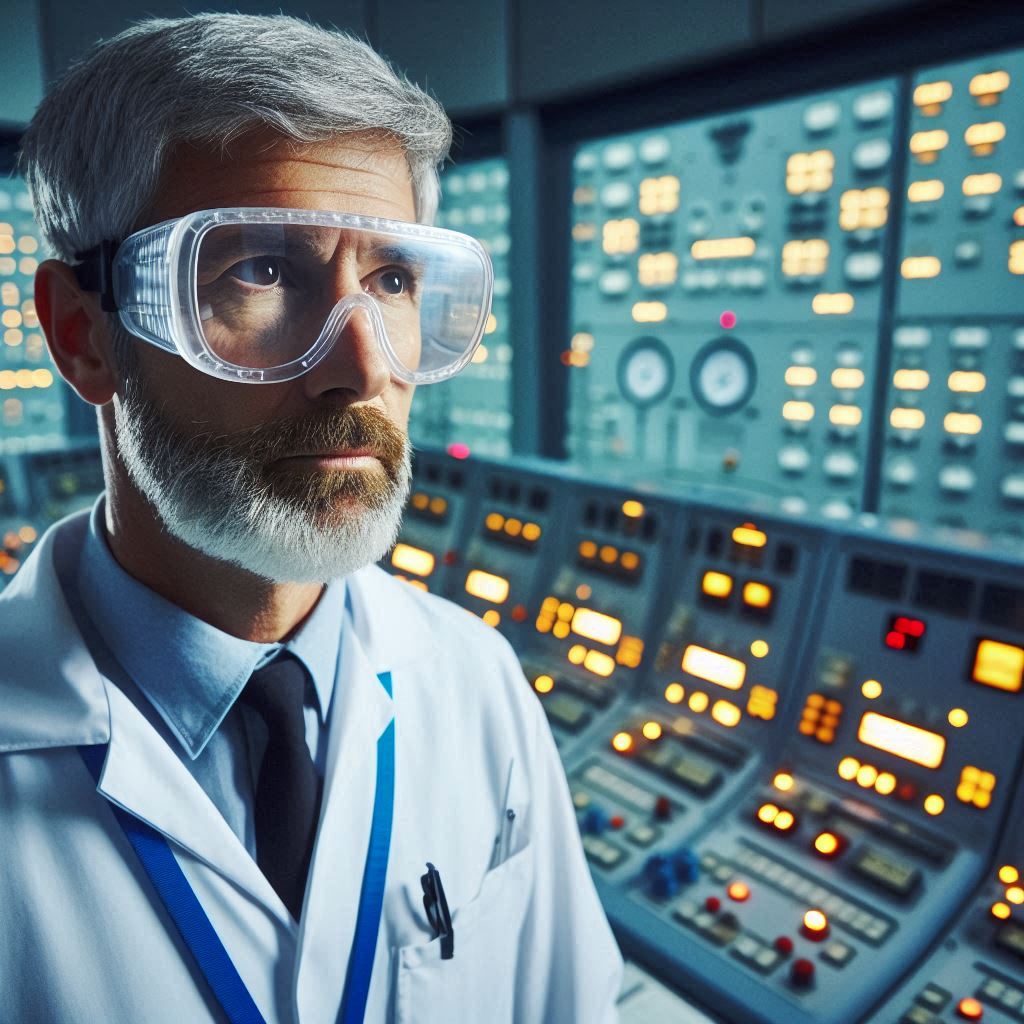Introduction
Ever wondered what a typical day looks like for a nuclear engineer? This blog will give you an inside look.
Nuclear engineers play a vital role in various industries.
They work in energy production, medical applications, and even space exploration.
Their expertise ensures the safe and efficient use of nuclear technology.
In energy production, nuclear engineers help design and manage reactors that generate electricity.
They focus on safety and efficiency to meet energy demands while minimizing environmental impacts.
In medicine, they develop and manage equipment for radiation therapy and imaging.
Their work improves diagnostic and treatment methods for numerous health conditions.
Additionally, nuclear engineers contribute to space exploration by developing propulsion systems and radiation shielding for spacecraft.
This blog will cover several aspects of a nuclear engineer‘s daily routine.
You will learn about the tasks they perform, the challenges they face, and the skills required for their role.
We will explore their work environment, from high-tech labs to energy plants.
By the end, you’ll have a clearer understanding of what it means to work as a nuclear engineer and why their role is crucial in various fields.
Join us as we delve into the dynamic and impactful world of nuclear engineering.
Educational background
Typical Educational Requirements for Becoming a Nuclear Engineer
Becoming a nuclear engineer starts with a strong educational foundation.
The first step is earning a bachelor‘s degree in nuclear engineering or a closely related field.
This undergraduate degree lays the groundwork for understanding the principles of nuclear technology, reactor systems, and radiation safety.
The curriculum typically includes courses in nuclear physics, thermodynamics, fluid dynamics, and reactor design.
Following the bachelor‘s degree, many aspiring nuclear engineers opt for advanced education.
Pursuing a master‘s degree or a Ph.D. in nuclear engineering or a related field can offer deeper insights into specialized areas.
Graduate programs often involve research projects, which provide hands-on experience with cutting-edge technologies and advanced methodologies.
These higher degrees can also open doors to leadership roles or academic positions in the future.
The Importance of Obtaining a Degree in Nuclear Engineering or a Related Field
Obtaining a degree in nuclear engineering or a related field is crucial for several reasons.
First, it provides the foundational knowledge needed to work safely and effectively with nuclear technology.
Topics covered include nuclear reactions, radiation shielding, and the behavior of nuclear materials, all of which are critical for designing and operating nuclear systems.
A specialized degree ensures that you understand the complex safety regulations and technological aspects of nuclear engineering.
This expertise is essential for roles involving reactor design, safety analysis, and system management.
Without this targeted education, you may lack the specific skills required for these high-stakes positions.
Additionally, a degree from an accredited program can enhance your job prospects and credibility in the field.
Many employers and regulatory bodies require proof of formal education to ensure that candidates have the necessary knowledge and skills.
Additional Certifications or Licenses That May Be Required
In addition to a degree, nuclear engineers often need certifications or licenses to advance in their careers.
One important certification is the Professional Engineer (PE) license.
This credential is awarded by state licensing boards and demonstrates a high level of competence and professionalism in engineering.
The process usually involves passing a rigorous exam and completing a certain amount of work experience.
Specific roles within nuclear engineering, such as nuclear power plant operators, may require additional certifications.
These can include training and certification in operating procedures, safety protocols, and regulatory compliance.
These certifications ensure that individuals can handle complex systems and adhere to strict safety and regulatory standards.
Read: Comparison: Architecture Styles across American Regions.
Daily tasks
Various Tasks That a Nuclear Engineer May Perform on a Daily Basis
Nuclear engineers engage in a range of tasks each day, focusing on the design, operation, and safety of nuclear systems.
A significant part of their day involves monitoring nuclear reactors.
They ensure that all systems operate within safety parameters and address any anomalies.
They might also conduct routine inspections of reactor components and systems.
Another key task is analyzing data from nuclear processes.
Engineers interpret this data to optimize reactor performance and maintain safety standards.
They may also work on developing and implementing maintenance schedules to prevent potential issues.
Nuclear engineers frequently collaborate with other professionals.
They work with physicists, safety experts, and technicians to troubleshoot and resolve technical problems.
They may be involved in designing and testing new nuclear technologies or improving existing systems.
The Importance of Attention to Detail in Carrying Out Tasks
Attention to detail is crucial in the field of nuclear engineering.
Even minor errors can lead to significant safety hazards or operational inefficiencies.
Engineers must meticulously follow procedures and protocols to ensure that all systems function correctly.
Precision in monitoring reactor operations is essential.
Any deviation from established parameters needs to be addressed immediately to avoid potential risks.
Accurate data analysis and interpretation are also vital for making informed decisions and maintaining system safety.
The Different Types of Projects That a Nuclear Engineer May Work On
Nuclear engineers work on diverse projects, each with unique challenges and objectives.
One type of project involves the design and construction of nuclear reactors.
This includes developing new reactor designs or upgrading existing facilities to enhance safety and efficiency.
Engineers also work on nuclear power plant operations.
They ensure that plants run smoothly, safely, and efficiently.
This involves managing fuel cycles, monitoring reactor performance, and implementing safety protocols.
Research and development projects are another area of focus.
Engineers may work on developing new nuclear technologies, such as advanced reactor designs or innovative fuel types.
These projects aim to improve the sustainability and efficiency of nuclear energy.
Read: The Role of NCARB in US Architecture Licensing.
Safety protocols
Strict Safety Protocols That Nuclear Engineers Must Adhere To At All Times
- Nuclear engineers must always wear protective gear like lead aprons and gloves.
- Engineers must follow strict safety guidelines established by regulatory agencies.
- Regular safety training sessions are conducted to ensure engineers are up to date.
- Engineers must be vigilant and report any safety concerns immediately.
- Strict protocols for handling radioactive materials are in place to prevent exposure.
Potential risks
- Exposure to radiation can lead to serious health issues for nuclear engineers.
- Mishandling of radioactive materials could result in contamination of the environment.
- Accidents such as leaks or meltdowns can have catastrophic consequences on surrounding areas.
- Engineers may face psychological stress due to the high-pressure nature of the job.
- Failure to follow safety protocols can result in accidents and endanger lives.
Importance of following safety procedures
- Following safety procedures is crucial to prevent long-term health risks.
- Adhering to safety protocols ensures the well-being of the engineers and the public.
- Preventing accidents safeguards the reputation of the nuclear facility and the industry.
- Strict adherence to safety measures promotes a culture of safety in the workplace.
- By following safety procedures, engineers contribute to the overall success of nuclear projects.
Read: The Journey: How to Become an Architect in the USA.

Collaboration with other professionals
Nuclear Engineers and Physicists
Nuclear engineers and physicists often collaborate on projects related to nuclear energy and radiation.
Physicists provide the theoretical framework and scientific expertise, while nuclear engineers apply this knowledge to practical applications in the nuclear industry.
Working together allows for a more comprehensive understanding of complex nuclear processes and technologies.
Importance of Effective Communication and Teamwork
Effective communication and teamwork are essential for nuclear engineers to successfully complete projects on time and within budget.
Clear communication ensures that all team members are on the same page regarding project requirements, timelines, and objectives.
Collaboration within a team allows for the pooling of knowledge and skills, leading to innovative solutions to complex problems.
Benefits of Collaborating with Colleagues from Different Backgrounds
Collaborating with colleagues from different backgrounds brings a variety of perspectives to the table.
This diversity of thought can lead to more creative problem-solving and innovative solutions.
Working with individuals from different disciplines also allows nuclear engineers to learn new skills and approaches that they may not have considered otherwise.
Read: US Tech Hubs Beyond Silicon Valley: Emerging Cities
Problem-solving skills
Strong problem-solving skills are crucial for nuclear engineers to navigate the challenges they face daily. These professionals must be able to think critically and creatively to solve complex problems efficiently.
Importance of strong problem-solving skills in the field of nuclear engineering
- Nuclear engineers work with advanced technology that requires quick and effective problem-solving skills.
- Being able to analyze scenarios and develop innovative solutions is essential for ensuring safety and operational efficiency.
- Strong problem-solving skills lead to improved decision-making, cost-effectiveness, and overall project success.
Critical and Creative Thinking in Nuclear Engineering
Nuclear engineers face complex challenges that demand both critical and creative thinking.
Their work involves designing, analyzing, and maintaining systems that handle radioactive materials and nuclear reactions.
Critical thinking is essential for troubleshooting issues, ensuring safety, and meeting stringent regulations.
Engineers must assess risks, analyze data, and predict outcomes to make informed decisions that safeguard public health and the environment.
Creativity is equally important, as nuclear engineers often encounter unique problems that require innovative solutions.
Whether developing new safety protocols, improving reactor efficiency, or designing advanced systems for waste management, engineers must think outside the box.
Creative problem-solving enables them to devise novel approaches that address both technical and practical aspects of their work.
Examples of common challenges in nuclear engineering
- Emergency situations that require immediate action and strategic problem-solving to prevent accidents.
- Equipment malfunctions or technical failures that need to be diagnosed and resolved promptly to avoid disruptions.
- Regulatory compliance issues that demand meticulous problem-solving to meet safety and environmental standards.
Gain More Insights: Wind Turbine Technician Certification Process
Career Growth Opportunities
The Potential Career Paths Available to Nuclear Engineers
Nuclear engineers have diverse career paths available to them.
They can work in energy production, nuclear medicine, or research and development.
In energy production, engineers design and maintain reactors for power plants.
In nuclear medicine, they develop and improve diagnostic and therapeutic techniques.
Research roles involve advancing nuclear technology and safety measures.
How Gaining Experience and Additional Qualifications Can Lead to Advancement Opportunities
Gaining experience and additional qualifications can significantly boost career advancement.
Practical experience in the field helps develop problem-solving skills and technical expertise.
Advanced degrees and specialized certifications can open doors to higher-level positions, including management and research roles.
Continuous learning and professional development are key to staying competitive and advancing in your career.
The Demand for Nuclear Engineers in Various Industries and Sectors
The demand for nuclear engineers is strong across various industries.
In the energy sector, there is a constant need for experts to operate and innovate nuclear power plants.
The healthcare industry requires engineers to work on cutting-edge technologies in nuclear medicine.
Additionally, government and research institutions seek nuclear engineers for projects involving nuclear safety and technology development.
This broad demand underscores the importance and relevance of the field in today‘s world.
Transform Your Career Today
Unlock a personalized career strategy that drives real results. Get tailored advice and a roadmap designed just for you.
Start NowGain More Insights: Industrial Engineering Internships Explained
Work-life balance
Potential challenges
- Long hours: Nuclear engineers often work long hours, which can make it difficult to find time for personal activities.
- High-stress environment: The high-pressure environment of working with nuclear technology can lead to increased stress levels.
- Shift work: Some nuclear engineers work in shifts, which can disrupt traditional work hours and make it challenging to maintain a routine.
Tips for managing stress
- Practice mindfulness: Take a few minutes each day to practice mindfulness and focus on the present moment.
- Exercise regularly: Physical activity can help reduce stress and improve overall well-being.
- Seek support: Don’t hesitate to seek support from colleagues, friends, or mental health professionals if needed.
Importance of setting boundaries
- Define work hours: Clearly define your work hours and make an effort to stick to them.
- Take breaks: Take regular breaks throughout the day to rest and recharge.
- Prioritize self-care: Make time for activities that promote self-care and well-being.
Taking time off to recharge
- Use vacation days: Take advantage of your vacation days to rest and rejuvenate.
- Plan regular days off: Schedule regular days off to spend time with loved ones and pursue hobbies.
- Unplug from work: Disconnect from work during time off to fully recharge and relax.
Conclusion
In this blog post, we explored a typical day in the life of a nuclear engineer.
We examined their roles, from designing and maintaining nuclear systems to ensuring safety and efficiency.
The day starts with analyzing data and monitoring equipment, then moves to problem-solving and collaborating with teams.
Nuclear engineers often engage in research and development to enhance nuclear technology.
They also conduct safety inspections to prevent potential hazards.
Nuclear engineers are pivotal in advancing technology across various industries.
Their expertise drives innovation in energy production, medical treatments, and environmental solutions.
They work on cutting-edge projects that contribute to cleaner energy and improved safety protocols.
Their efforts help to meet the world‘s growing energy demands while minimizing environmental impact.
If you are passionate about science and technology, a career in nuclear engineering could be an excellent fit.
The field offers diverse opportunities to make significant contributions to society.
By pursuing this career, you can be at the forefront of technological advancements and help solve some of the world‘s most pressing challenges.
Consider exploring this dynamic field further if you are eager to drive progress and innovation.
[E-Books for Sale]
The Big Book of 500 High-Paying Jobs in America: Unlock Your Earning Potential
$19.99 • 500 High-Paying Jobs • 330 pages
Explore 500 high-paying jobs in America and learn how to boost your career, earn more, and achieve success!
See All 500 High-Paying Jobs of this E-Book
1001 Professions Without a Degree: High-Paying American Jobs You Can Start Now
$19.99 • 1001 Professions Without a Degree • 174 pages
Discover 1001 high-paying jobs without a degree! Unlock career tips, skills, and success strategies for just $19.99!




